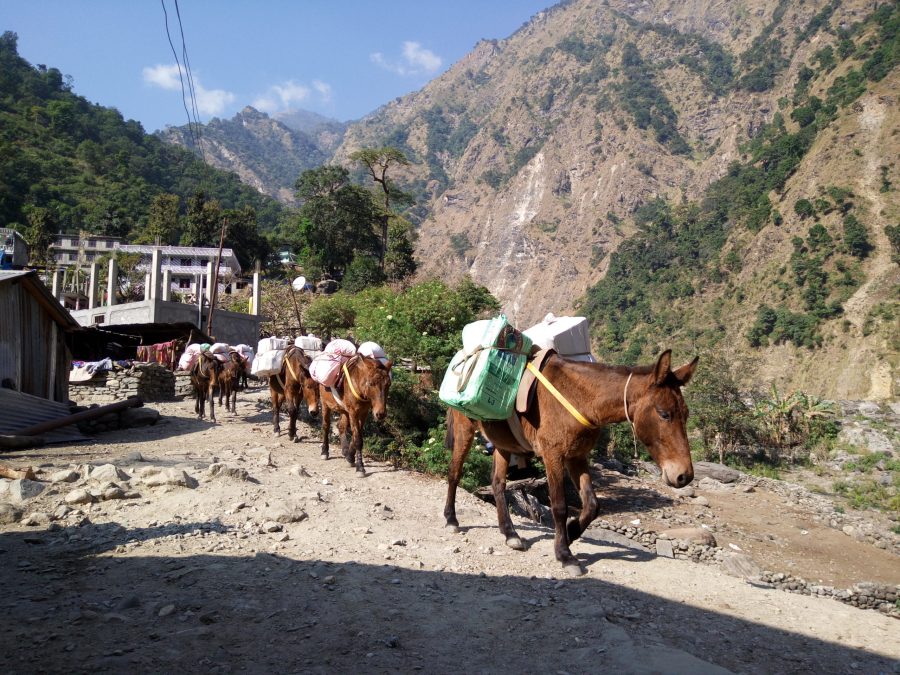Donkeys and mules play a vital but often unrecognised role in rebuilding disaster-hit communities in low- to middle-income countries, according to new research by The Donkey Sanctuary.
The sanctuary is highlighting the crucial role donkeys play in building resilience and the support they offer communities immediately after a disaster, as part of today’s United Nations’ International Day for Disaster Risk Reduction (13 October).
The Donkey Sanctuary’s research paper, Resilience and the Role of Equids in Humanitarian Crises was published in Disasters (July 2021), a peer-reviewed journal reporting on all aspects of disaster studies, policy and management.
The paper’s key author Cara Clancy, senior researcher at The Donkey Sanctuary, said: “Donkeys and mules are a key part of the social fabric in many lower to middle income countries (LMICs), providing an essential source of income for some of the most marginalised communities in the world.
“It is often these vulnerable populations, which suffer most when disaster strikes due to a lack of adequate housing, poor infrastructure and limited access to health services.”
‘Indispensible’
The research shows working animals not only play an essential role in building resilience in but also offer crucial support immediately after a disaster.
Aid efforts typically focus on people rebuilding the economy as well as damaged buildings, water supplies and communications after a humanitarian crisis, but working donkeys and mules are indispensable in the rebuilding process.
For example, donkeys can transport people in and out of affected areas and deliver life-saving aid to communities, which cannot be reached by vehicles.
The animals can also transport materials for the re-building of roads, homes and other buildings damaged during the disaster.
Donkeys and mules were able to collect and deliver clean water and supplies after the 2015 earthquake in Nepal.
The earthquake, which cost the lives of almost 9,000 people, flattened entire villages consisting of low-cost informal buildings that stood little chance of withstanding the devastating impact.
It also cut off mountain communities when roads became hazardous or impassable for motorised vehicles.
Building resilience
More recently, donkeys have been helping rural communities in Africa during the global Covid-19 pandemic.
With funding from The Donkey Sanctuary and using local donkeys, the Meru Animal Welfare Organisation (MAWO) installed and filled water and soap dispensaries in medical centres across northern Tanzania to combat the spread of the disease.
Johnson Lyimo, president and founder of MAWO said: “Donkeys were crucial in helping to build resilience in our area, the Simanjiro district of northern Tanzania.
“Local donkeys were crucial to move large quantities of water from distant sources needed to fill containers for patients to wash their hands before seeing a doctor.
“The project also helped to promote the importance of general good hygiene practices via the donkey-owning communities,” continued Johnson.
‘Liberating women and children’
Donkeys and mules also help their owners to get back to work, restoring income and social stability. An estimated 500 million people in the world’s poorest communities rely on working equids as a lifeline to support their livelihoods.
Donkeys and mules play an essential role ploughing and tilling agricultural land in rural communities.
They often free up women to participate in economic activity, helping to elevate their social status; they may also liberate children enabling them to access education.
Tamlin Watson, senior researcher at The Donkey Sanctuary and contributor to the research article, said: “Working equines must be considered in the wider context of international development and achieving the United Nations Sustainable Development Goals (SDGs).
“Ending poverty and hunger for all requires building the resilience of the marginalised and vulnerable to reduce their exposure to climate-related events as well as other environmental shocks.
“Donkeys and mules help build this resilience.”
Extreme weather events such as drought, fire and flooding are becoming increasingly common due to climate change.
Disasters are not always sudden like earthquakes or hurricanes; they can also build up slowly, as in the case of prolonged drought.
The research found donkeys play a critical role in recurrent and protracted crises, such as prolonged drought.
They are increasingly important to the evolving survival tactics of rural communities in east Africa’s drylands, where there is increasing reliance on donkeys as they can survive in areas of sparse vegetation and little water.
The research article is available to read for free here.










